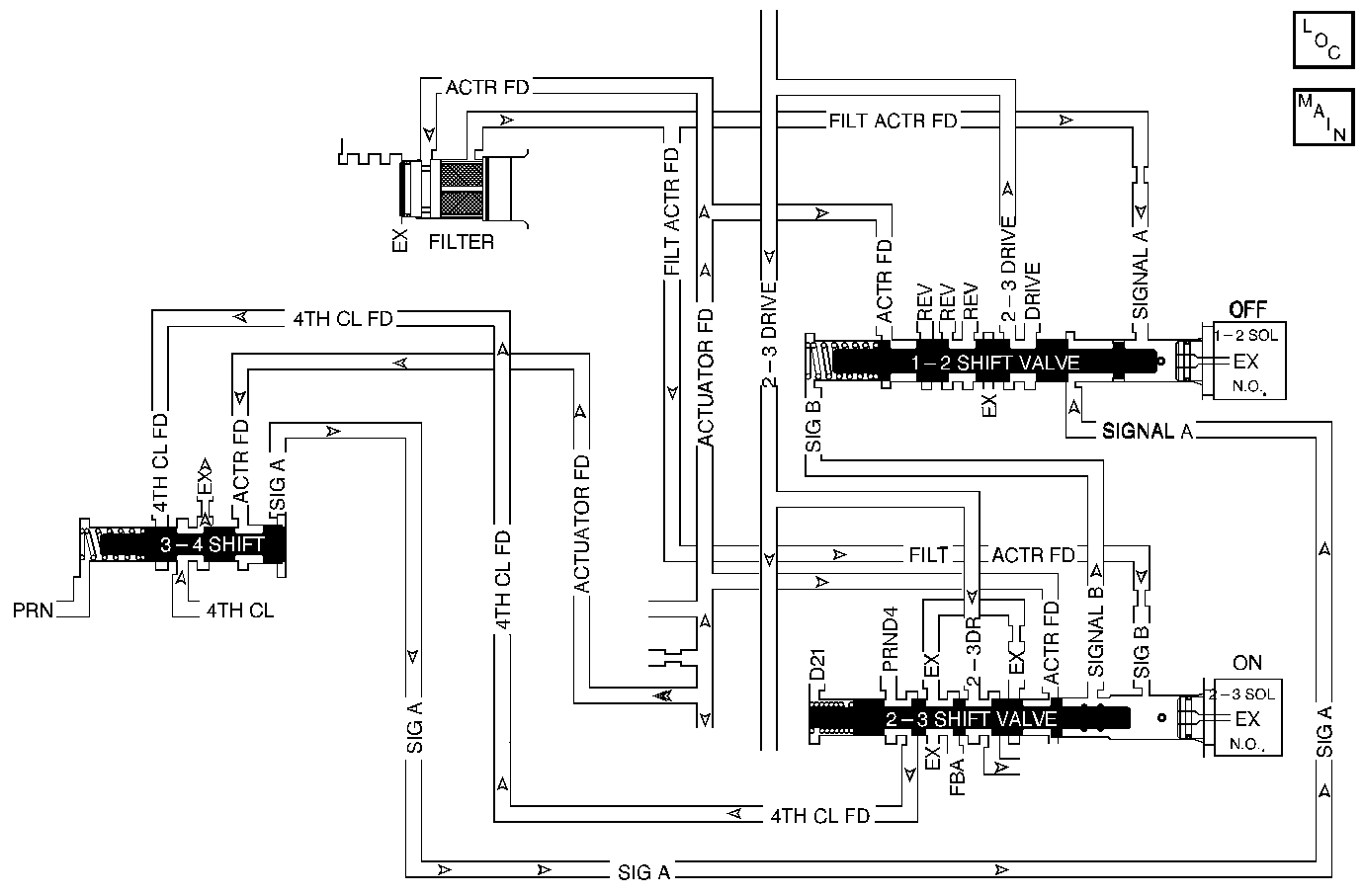DTC P0756 2-3 Shift Solenoid Valve Performance Gas

Circuit Description
The 2-3 shift solenoid (SS) valve controls fluid flow acting on the 2-3 shift valves. The 2-3 SS valve is a normally-open exhaust valve used with the 1-2 SS valve in order to allow for four different shift combinations.
If the VCM detects a non first gear ratio while first gear is commanded, or a first gear ratio while fourth gear is commanded, then DTC P0756 sets. DTC P0756 is a type C DTC. For California emissions vehicles, DTC P0756 is a type A DTC.
Conditions for Running the DTC
| • | No MAF sensor DTCs P0101, P0102, or P0103. |
| • | No MAP sensor DTCs P0106, P0107, or P0108. |
| • | No TP sensor DTCs P0121, P0122, or P0123. |
| • | No OSS DTCs P0502 or P0503. |
| • | No ISS DTCs P0716 or P0717. |
| • | No 4WD low DTC P1875. |
| • | Not in 4WD low. |
| • | No TFP manual valve position switch DTC P1810. |
| • | No shift solenoid electrical DTCs P0753 or P0758. |
| • | The engine runs more than 475 RPM for 7 seconds. |
| • | The vehicle speed is greater than 4 km/h (2.0 mph). |
| • | The TP angle is greater than 8%. |
| • | The transmission fluid temperature (TFT) is greater than 20°C (68°F). |
| • | The engine torque is 108 N·m (80 lb ft) to the following: |
| - | 542 N·m (400 lb ft) 5.7L |
| - | 678 N·m (500 lb ft) 7.4L |
Conditions for Setting the DTC
All conditions for running the DTC are met, and either of the two following conditions occur:
Stuck On (for 2 occurrences)
When the 2-3 SS valve is stuck on, the commanded gear equals 1st and the ratio equals 4th for greater than 2 seconds, and the commanded gear equals 2nd and the ratio equals 3rd for greater than 3 seconds.
Stuck Off (for 7 occurrences)
When the 2-3 SS valve is stuck off, the commanded gear equals 3rd and the ratio equals 2nd for greater than 3 seconds.
Action Taken When the DTC Sets
| • | The VCM illuminates the malfunction indicator lamp (MIL) for California emissions vehicles. |
| • | The transmission immediately lands to 2nd gear. |
| • | The VCM commands maximum line pressure. |
| • | The VCM freezes shift adapts. |
| • | The VCM stores DTC P0756 in VCM history. |
Conditions for Clearing the MIL/DTC
| • | For California emissions, the VCM turns OFF the MIL during the third consecutive trip in which the diagnostic test runs and passes. |
| • | A scan tool clears the DTC from VCM history. |
| • | For California emissions, the VCM clears the DTC from VCM history if the vehicle completes 40 consecutive warm-up cycles without an emission related diagnostic fault occurring. |
| • | For Federal emissions, the VCM clears the DTC from VCM history if the vehicle completes 40 consecutive warm-up cycles without a non-emission related diagnostic fault occurring. |
| • | The VCM cancels the DTC default actions when the fault no longer exists and the ignition switch is OFF long enough in order to power down the VCM. |
Diagnostic Aids
| • | Verify that the transmission meets the specifications in the Shift Speed table. |
| • | Other internal transmission failures may cause more than one shift to occur. |
| • | The customer may complain of an engine over-rev condition or neutral condition in 4th gear. |
| • | First diagnose and clear any engine DTCs or TP sensor codes that are present. Then inspect for any transmission DTCs that may have reset. |
| • | Refer to Shift Solenoid Valve State and Gear Ratio table. |
Test Description
The numbers below refer to the step numbers on the diagnostic table.
-
This step tests the function of the TFP valve position switch.
-
This step tests for a selected gear ratio versus a ratio not obtainable under normal operating conditions.
Step | Action | Value(s) | Yes | No | ||||
|---|---|---|---|---|---|---|---|---|
1 | Did you perform the Powertrain Diagnostic System Check? | -- | Go to Powertrain On Board Diagnostic (OBD) System Check 5.0/5.7L or Powertrain On Board Diagnostic (OBD) System Check 7.4L | |||||
Important: Before clearing the DTC, use the scan tool in order to record the Freeze Frame and Failure Records. Using the Clear Info function erases the Freeze Frame and Failure Records from the VCM. Refer to the Transmission Fluid Pressure Manual Valve Position Switch Logic table. Does each selected transmission range match the scan tool TFP switch A/B/C display? | -- | |||||||
Was 1st gear commanded and not achieved, or 4th gear commanded and another gear occurred? (You may need to road test the vehicle). | -- | Go to Diagnostic Aids | ||||||
4 |
Refer to Symptom Diagnosis . Was the condition corrected? | -- | -- | |||||
5 | Perform the following procedure in order to verify the repair:
Has the test run and passed? | -- | System OK |
